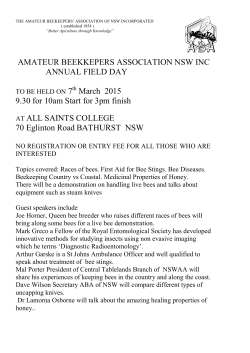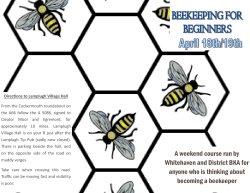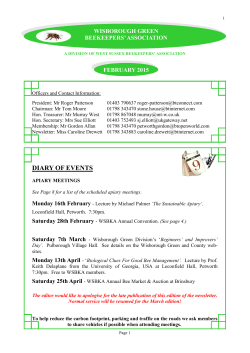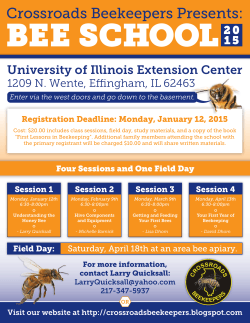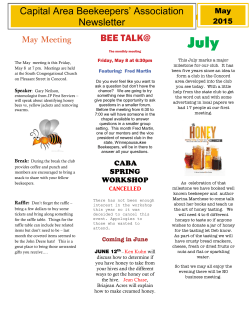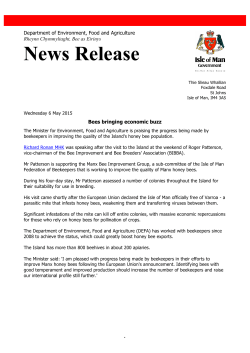
May 2015 - WordPress.com
Chelmsford Beekeepers’ Newsletter May 2015 www.chelmsfordbeekeepers.com A pril’s Meeting We had an interesting talk from a member of St John Ambulance on Anaphylaxis, choking and the recovery position. He showed us how to use an Epipen and the symptoms that precede anaphylactic shock. The most valuable advice that came out of last month’s meeting was that beekeepers should ensure that they and someone else know exactly where they are in the case of an Next Meeting: 18th May 2015 7:30 – 9:30 pm. Trinity Methodist Church, Rainsford Road, Chelmsford, Essex, CM1 2XB . John O'Connell (from Romford Division) will be giving advice about swarms. The talk is aimed at all beekeepers, not just those who volunteer to take swarms. What if they are your bees swarming? Even experienced beekeepers will experience this. For Sale emergency - ie. post code and/or grid reference If your apiary is in your garden this will be fairly straightforward. If you use an out apiary the postcode may be available but if you use farmland, a grid reference might be valuable to the Ambulance service and most modern phones have the facility to tell you (ask your children/ grandchildren if you don’t know how!) If you go to the apiary on your own, consider informing someone when you will be there and then again when you are safely away from your bees; this person (and any others you might use) would have details of where your hives are just in case anything happens while you are there. Keep your phone handy—it’s possible to develop a severe response to bee stings. Many thanks to Sean Ferguson for being the volunteer patient. B ee Husbandry – 23rd June with Jane Ridler This is an additional meeting for year 2/3 beekeepers who would like to learn more about the ‘perfect hive inspection’ and watch Jane as she demonstrates some of the more advanced hive manipulations. These could include the following but will obviously be dependant on the state of the colonies at the apiary on the day. a brood disease inspection; an artificial swarm; preparing a colony for moving to another site; make up a nucleus; perform a shook swarm; perform a Bailey comb change for both a weak and strong colony; re-queen a large, potentially aggressive colony with a queen from a better strain in a nucleus Numbers are limited so to reserve a place, please contact the secretary as soon as possible. Geoff Mills’ Colonies: in modified nationals. Brood and a half plus super. Disease checked and Apiguard treated. If interested contact Roy Hardwicke on 01245 225950 You will find other bees/nucs/ beesuits/equipment for sale on our website: (Click here) You will need the password because it is on the Members’ section. Membership We now have 134 members. A big welcome to those who have joined recently. We hope you will be able to come to meetings and learn more about the craft of beekeeping. Please, if you haven’t already done so, make contact with Pam Hughes our New Member coordinator. M r Beesy Says - The rape is in flower, but at the moment there is nothing coming in. I have found over the years that the big flow from oil seed rape is when it has been in flower for about two weeks. So after the holiday, when they say it will get warmer, the bees will be very busy. Remember, you must have access to an extractor as soon as the flowers start to go off. Even if there is no rape nearby they will find garden flowers etc. Then we shall be right into the swarming season, so think about what you are going to do when you find a swarm cell. Although the artificial swarm system is reasonably reliable, it does entail a certain amount of work and requires an extra hive. If you only have a nuc box, a way out is to make up a good nuc with one or two queen cells, then fill the gap in the brood nest with frames of foundation, which will probably solve the problem. H oney Selling Opportunity Essex Wildlife Trust Colchester Local Group are holding an open Garden and family day at the Essex Wildlife Trust Headquarters at Abbotts Hall Farm on Sunday 28th June. If you are interested to sell honey and also to take along some bees/beekeeping equipment, get in touch with our Secretary, Brian. H B ook Review Haynes Bee Manual - The complete step-by-step guide to keeping bees. I have recently read the Haynes Bee Manual on Beekeeping. Yes, that’s right - the same people responsible for the workshop manuals for cars such as the Ford Focus and the Austin Allegro among many others. It’s a fantastic, no-nonsense beginners’ book that has a clearly marked colour coded index allowing the reader to drill down into the required section easily. Its full of well illustrated diagrams of kit, manipulations and the overall beekeeping year. There is a useful section on choosing a hive, and how to assemble frames and foundation. It also covers some more advanced techniques with step by step instructions, such as how to carry out an artificial swarm, and introduce a queen, all replete with well drawn illustrations. Near the back of the ‘manual’ is a section dedicated to pests and diseases with a comprehensive collection of photographs of problems from SHB to rats. A very handy guide for those in the early years of beekeeping, and one which I keep in my bee shed, just in case! The Haynes Bee Manual on Beekeeping is written by Claire and Adrian Waring with foreword by Bill Turnbull priced at £18. oney Jars -Last Reminder The closing date for receipt of orders is 1st June 2015 so if you haven’t already ordered yours, please do so straight away— the savings are considerable. You will find a form on the members’ section of our website or by following this link. L auriston Farm Visit (Biodynamic Farm Organism) Saturday 15th August 10.00 – 1.00 A visit has been arranged for a farm tour + tea and biscuits for up to 20 of our members and family. The farm is in Goldhanger so we could arrange to share cars. The cost is £3.50 per person. Please contact the secretary if you would like to be included on this trip. B orage We have been contacted by Barleylands to say that they have planted approximately 260 acres. (102 hectares) of borage and would welcome hives to assist pollination and provide bees with a source of light honey. This is not an offer that we receive often. The fields are in the locations CM3 8HU and CM2 8UF. If you are interested, please contact our secretary, Brian. Contacts: Websites: Chair: Margaret Clay 01245 350117 margaretclay@btinternet.com Secretary: Brian Spencer 07917 024931 chelmsfordbees@btinternet.com Treasurer: Ian Grant 01277 652855 iancgrant@btinternet.com Newsletter Editor: Dee Inkersole 01245 422627 inkersole@btinternet.com Disease and Spray Contact: Jean Smye: 07731 856361 jsmye@sky.com CBKA EBKA BBKA BDI: Bee Base
© Copyright 2024



